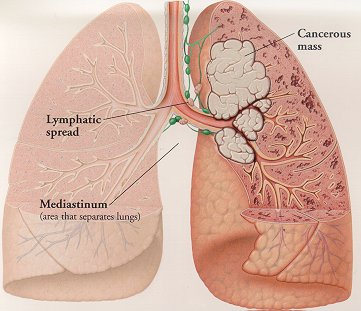There are two types of lung cancer; small cell lung cancer (SCLC) and non-small cell lung cancer (NSCLC). SCLC is believed to account for around 20% of all lung cancer diagnosis. This type of cancer develops when the small cells of the lung start to grow in a rapid and uncontrolled way. SCLC is often referred to as oat cell carcinoma because the small cells of the lung look similar to oats. In this article I will be discussing SCLC in greater detail.
There are
actually three types of SCLC cancer. In each type the cancer cells grow and
spread in different ways.
1) SMALL
CELL CARCINOMA: This is the most common form of SCLC representing around 95% of
all cases. This name is given when the cancer only affects the small cells of
the lung.
2) MIXED
SMALL CELL/LARGE CELL CARCINOMA: This is a less common sub-type of SCLC accounting
for 4%-6% of all cases. It occurs when the characteristics of both small and
large cell carcinoma (a type of NSCLC) are present. This sub-type is resistant
to both chemotherapy and radiation.
3)
COMBINED SMALL CELL CARCINOMA: This is the least common sub-type of SCLC and
accounts for approximately 1% of all cases. It occurs when the small cell
carcinoma combines with either squamous cell carcinoma (a type of NSCLC that
develops in the cells lining the airways) and/or adenocarcinoma (a type of
NSCLC that develops in the mucus producing cells).
Smoking
is the leading risk factor for this type of lung cancer and is thought to be
responsible for over 90% of SCLC occurrences. Since SCLC affects your lungs the
symptoms associated with this type of cancer are linked to this area of the
body. Some of the most common lung cancer symptoms include a regular cough,
breathlessness, chest pain and coughing up mucus or blood.
Most people are
unaware of the different types of lung cancer. Although SCLC is the less common
of the two types it is still very dangerous and can prove fatal if ignored. If
you have any concerns regarding this condition then go and see your doctor
right away. SCLC is a very serious, life threatening condition and you should
discuss any concerns, treatments or lifestyle changes fully with your doctor.
2 Top Tips For Preventing
Small Cell Lung Cancer
SCLC is
one of the less common types of lung cancer accounting for around 20% of all
diagnoses. It is often referred to as oat cell carcinoma because the small
cells of the lungs look similar to oats. SCLC develops when the small cells of
the lung start to grow in a rapid and uncontrolled way leading to the formation
of malignant (cancerous) tumors. Unfortunately the outlook for people who
contract SCLC is bleak with the five year survival rate being less than 20%. However,
there are a number of things you can do to reduce your chances of developing
this disease. In this article I will be discussing three things you can do to
prevent small cell lung cancer.
1) QUIT
SMOKING: Smoking has been scientifically proven to cause a number of cancers. However,
it is most strongly linked with lung cancers. Every time you inhale the smoke
from a cigarette these carcinogens go straight to your lungs greatly increasing
the chance of cancerous growths in the small cells of your lungs. Therefore, by
quitting smoking you can significantly lower your chances of developing SCLC.
Uranium,
radon (which is created by the breakdown of uranium) and asbestos are all
thought to increase your likelihood of contracting SCLC. When combined with smoking
these substances are thought to be an even more significant SCLC risk. Therefore,
by avoiding these chemicals you can help prevent small cell lung cancer.
2) EAT
MORE FRUITS AND VEGETABLES: Although the research is not conclusive a number of
studies have suggested that fruits and vegetables can help prevent SCLC. As I
mentioned at the beginning of the article the survival rate for this type of
cancer is low.
By quitting smoking and avoiding smoky environments you can
drastically reduce your risk but by doing the other things listed in this
article too you can prevent small cell lung cancer even further. SCLC can be
prevented and I hope this article has shown you how.
Small
cell lung cancer is a very serious, life threatening condition and you should
discuss any concerns, treatments or lifestyle changes fully with your doctor.

















0 Comments
Thanks for your attention . Please writing comment